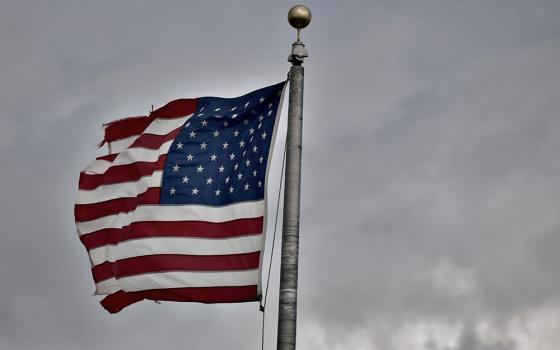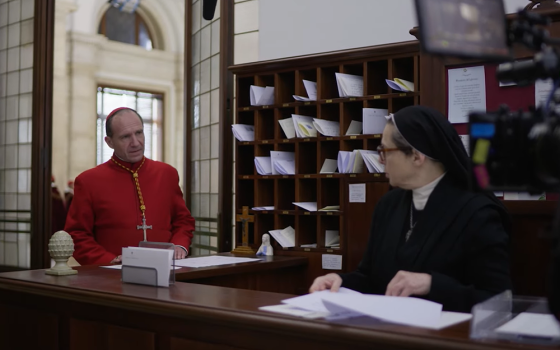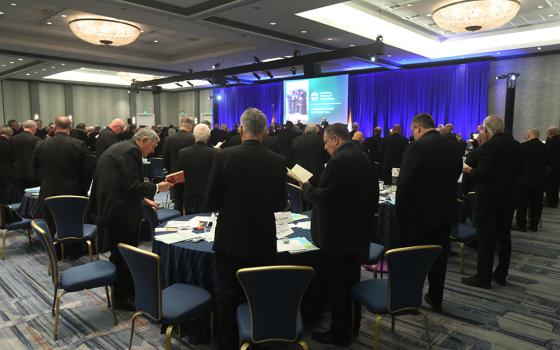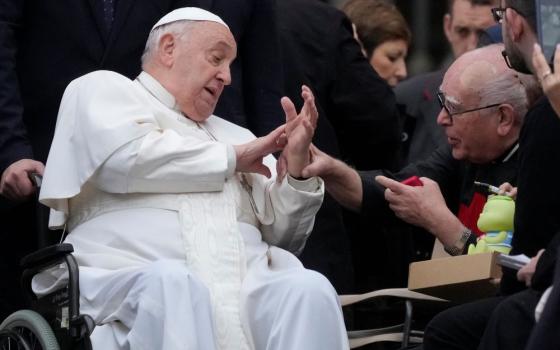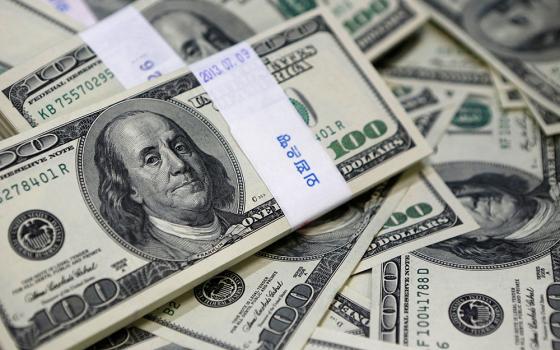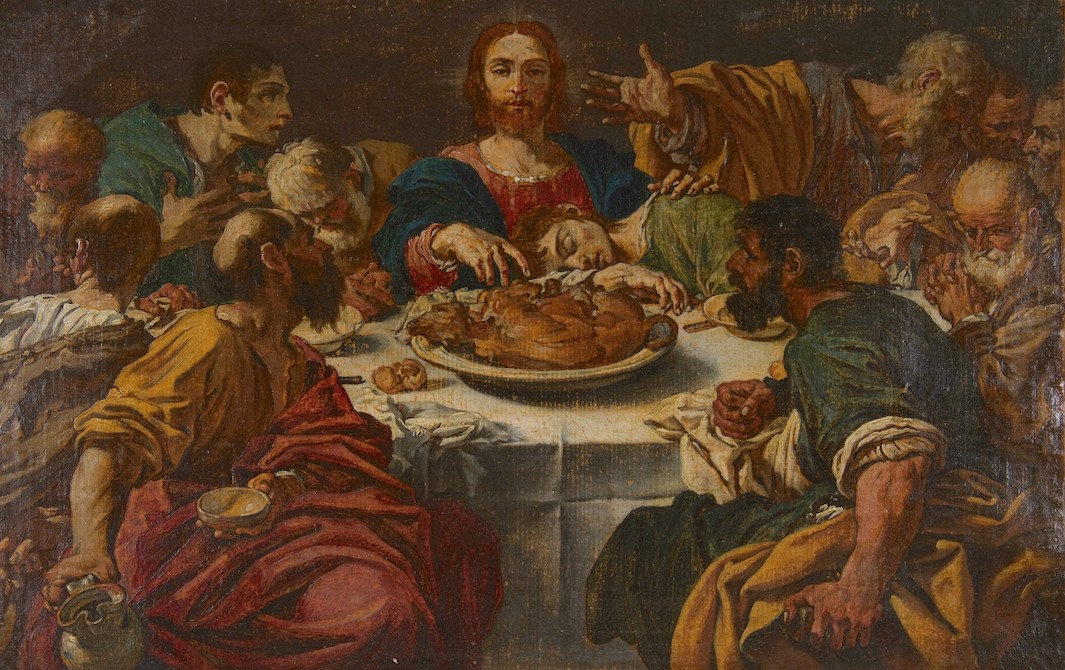
Understandably, the primary focus of the celebration of the Lord's Supper is on the establishment of the Eucharist as Christ's gift of his sacramental presence to the church. But this did not happen in a vacuum, and we would do well to remember what Scripture recounts about the context of what unfolded in that upper room. "The Last Supper," drawing by Bartolomeo Schedoni, 1578-1615 (Metropolitan Museum of Art)
What we inaugurate tomorrow evening with the Sign of the Cross at the opening of the Holy Thursday liturgy is not just the beginning of the Mass of the Lord's Supper, but the opening of a three-day-long celebration of Christianity's most sacred solemnity: the Easter triduum.
The components of this singular liturgy — Holy Thursday, Good Friday, Holy Saturday and the great Easter Vigil — are not merely discrete services or isolated rituals, but united moments or chapters in calling to mind the profundity of the paschal mystery.
Although this year's celebration of Holy Week is, like last year's, affected by the restrictions of the pandemic and therefore unusual, the familiarity most Christians have with what each chapter of the triduum emphasizes may inadvertently lead many of us to miss the powerful and timely implications of what we commemorate.
Whether we are gathered together socially distanced and masked in a physical church or connected via livestream to the liturgical celebration, the challenge remains for us to attend to the way the Holy Spirit continues to speak to the church and world, not only about what Jesus accomplished millennia ago, but what the salvific work of Christ means for us today.
And those with attentive eyes, ears, minds and hearts can see how the scandal of the life, death, and resurrection of Christ ought to challenge all Christians here and now.
Holy Thursday
Understandably, the primary focus of the celebration of the Lord's Supper is on the establishment of the Eucharist as Christ's gift of his sacramental presence to the church. But this did not happen in a vacuum, and we would do well to remember what Scripture recounts about the context of what unfolded in that upper room.
First, as we hear proclaimed in the Gospel reading for Holy Thursday (John 13:1-15), the Eucharist is always tied to the ministry of service. This obviously did not sit well with some of those gathered that evening, as Simon Peter's resistance to Jesus's model of ministry bears witness. Today, sadly, there are still many who are in positions of ecclesial leadership and pastoral ministry who continue to repeat this misguided resistance.
Such presiders and ministers wrongly make the sacraments about themselves and not those for whom such divine gifts are intended. We see this when pastors maintain a unilateral or domineering style of leadership, insisting that "father knows best" while the rest of the faithful are subjugated to his preferences, whims or need for control. There is nothing Christian about such pseudo-leadership.
The second often overlooked aspect of Holy Thursday's context is the scandal of Christ's radical inclusivity. How quick so many Christians are to forget those with whom Jesus chose to associate, called to be his followers, and entrusted with carrying his mission forward into the world.
All of those gathered in the upper room were sinners, just like we all are. Furthermore, those gathered closest to him around that sacred table are betrayers, deniers, cheaters and cowards who not only gravely sinned before this first Eucharist but also persisted in grave sin immediately afterward. And yet, Jesus did not demand some false sense of purity or even ask for contrition before they were invited to partake of his body and blood.
Those who today insist on their right to judge the outward "worthiness" of particular women and men or whole communities and categories of people to receive the Eucharist or participate in the sacramental life of the church cause grave scandal, and not in the good way that Jesus modeled. The denial of Communion on account of an individual minister's decision insults the dangerous memory of the divine gift that is the Lord's Supper. We who are the church's ministers would do well to reflect on this tomorrow and beyond.
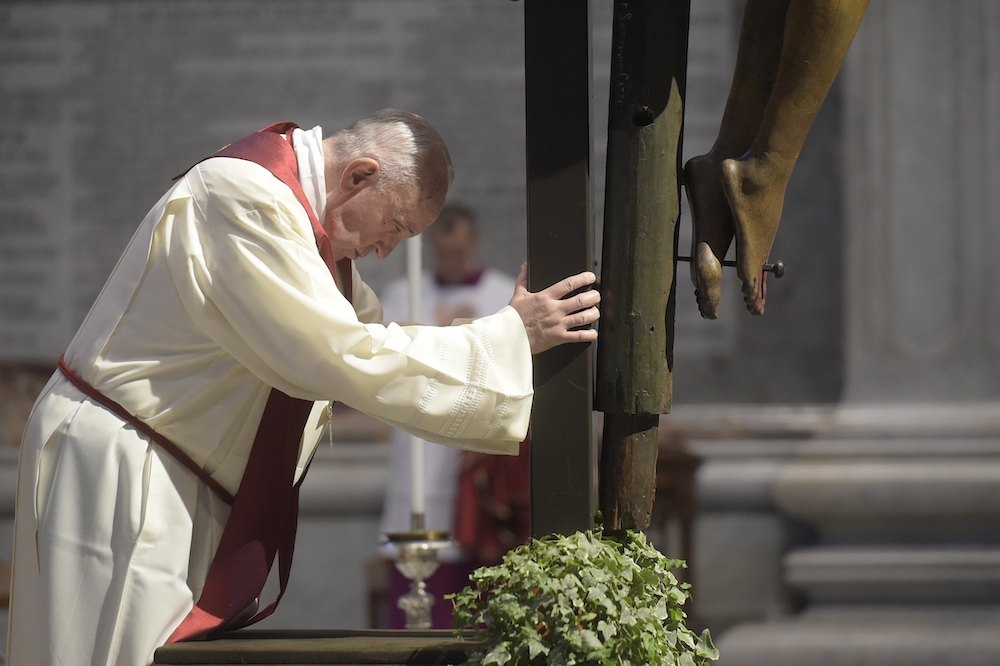
Pope Francis venerates the cross April 10, 2020, during the Good Friday Liturgy of the Lord's Passion in St. Peter's Basilica at the Vatican. (CNS/Vatican Media)
Good Friday
What we commemorate during the Passion of the Lord is the wrongful execution of an innocent man by the state. If you do not think about the abhorrent sinfulness of the death penalty on Good Friday, then you're missing a huge part of the picture. It does little good to talk about how "Christ died for our sins" without calling to mind the context in which he died: sentenced to death, tortured and murdered by the government of his time.
Last week, Virginia Gov. Ralph Northam signed into law a bill that abolished the death penalty in the commonwealth. This is a historic action for several reasons, including the fact that Virginia is responsible for the highest number of state executions second only to Texas, and it is the first southern state to eliminate capital punishment. In signing this bill into law March 24, Northam acknowledged the egregious racist history and inequitable application of the death penalty, noting that of the 377 people Virginia executed during the 20th century, 296 of them were Black.
Northam said: "The racism and discrimination of our past still echoes in our systems today," adding: "And as we continue to step beyond the burden of that past, it is vital that we also change the systems in which inequality continues to fester. … There is no place today for the death penalty in this Commonwealth, in the South or in this nation."
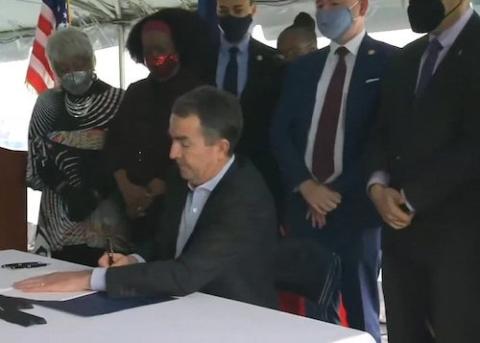
Virginia Gov. Ralph Northam signs legislation outside the Greensville Correctional Center in Jarratt March 24, 2021, making Virginia the 23rd state to abolish the death penalty. (CNS screen grab/Courtesy of Catholic Herald)
The abolition of the death penalty in Virginia is inarguably a positive move and something that should have been done decades if not centuries ago. However, that we still have a federal death penalty on the books and dozens of states continue to sentence human beings to be murdered by the government is sinful and scandalous.
As we call to mind the unjust trial and state execution of Jesus of Nazareth this Friday, hearing about the false accusations, show trial, torture, and horrendous last hours of the Word made flesh, let us also lament that our nation today is no better than the first-century Roman Empire on this count. It is not only a scandal and a grave form of hypocrisy to claim to be a Christian and support the death penalty, but it is a rejection of the church's teaching as Pope Francis made explicit last fall in his encyclical letter Fratelli Tutti: "Today we state clearly that 'the death penalty is inadmissible' and the Church is firmly committed to calling for its abolition worldwide."
Good Friday, as I have written about before, is both a time when the church's ministers ought to be preaching about the death penalty and the whole community of believers should reflect on how we can work together to end this injustice in our society.
Advertisement
Holy Saturday
Finally, the church in its wisdom does not allow us to move too quickly from the horrors of Good Friday to the triumph of Easter Sunday without time for reflection. Holy Saturday, which does not often receive the attention it rightly deserves, invites us to pause in the silence and uncertainty of everything that has transpired and what might still come. It is a kind of short advent, a moment of "already, not yet," that is cloaked in fear, loss and the unknown.
During this historical time of pandemic, Holy Saturday seems to take on new meaning. More than a year into this global tragedy, with effective vaccinations beginning to be distributed, there is a small but real glimmer of Easter hope of societal resurrection on the horizon. But we are not there yet. Hundreds of thousands of people have died, many of us have lost loved ones, and millions continue to suffer from the immediate and long-term physical, psychological and economic consequences of COVID-19.
At this stage of the pandemic, many of us are experiencing a kind of liminal existence, an in-between state between death and life, destruction and renewal, Good Friday and Easter Sunday. For this reason, Holy Saturday is more than just a stopover within our commemoration of the paschal mystery; it is the most apt solemnity for our pandemic time, a holy day of mourning and hope.
May this year's Easter triduum be blessed in whatever form you are able to celebrate and may it be an occasion for prayerful reflection on the scandalous relevance of our faith for this time.

